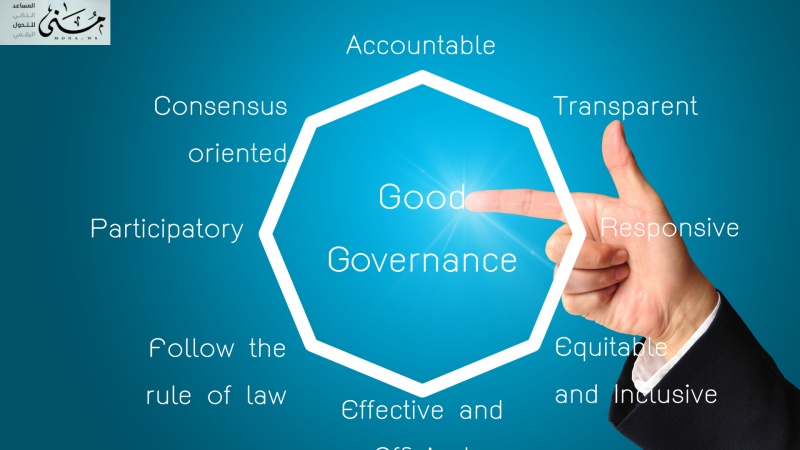The application of digital governance faces many challenges that require precise strategies to overcome, to ensure the successful and sustainable achievement of its goals. In this article, we will learn about the most important challenges facing the application of digital governance.
Technical challenges in implementing digital governance
One of the most significant obstacles facing organizations when implementing digital governance is the technical challenges, which require a robust infrastructure to efficiently support digital operations. These challenges include:
Weak technological infrastructure
Digital governance requires robust communication networks and advanced IT systems to fully support digital operations. Some organizations lack this infrastructure, limiting their ability to effectively implement digital governance strategies.
Cyber Security
Securing data and information is a major challenge, as organizations that rely on digital systems become more vulnerable to cyber attacks. It requires developing strategies to protect information from breaches and ensure data confidentiality and privacy.
Integration between systems
Organizations face the challenge of integrating legacy systems with modern digital systems. This integration is essential to ensure uninterrupted business continuity and achieve compatibility between traditional and digital operations.
Technical challenges can be overcome by:
- Investing in developing a robust infrastructure that supports digital transformation.
- Adopt advanced cybersecurity technologies, such as encryption systems and firewalls.
- Collaborate with IT service providers to update systems and ensure integration between legacy and new technologies.
DocSuite is a reliable system andCOBIT solves these challenges. They are two systems specifically designed for IT management and governance, each of which helps organizations organize digital operations and apply governance standards to achieve strategic goals.
Human Challenges in Implementing Digital Governance
The process of implementing digital governance is greatly affected by the human element, as employees in the organization constitute an essential part of the success of the process. However, some human challenges may arise that need to be addressed effectively, such as:
Digital skills shortage
Organizations suffer from a shortage of employees with sufficient technical skills to operate and manage digital systems.
Resistance to change
The organization may face resistance from employees who prefer traditional ways of working, which hinders the full implementation of digital governance.
Effective communication
The lack of clear communication channels between different teams within an organization can be a barrier to achieving digital governance goals.
Human challenges can be overcome by:
- Providing advanced training programs for employees to improve their digital skills and increase their awareness of the importance of digital transformation.
- Promote a culture of change within the organization by spreading awareness of the benefits of digital governance on overall performance.
- Establish effective communication channels to ensure that different teams collaborate to achieve governance objectives.
Administrative and organizational challenges in implementing digital governance
Administrative organization is a major factor affecting the success of implementing digital governance. However, institutions face administrative and organizational challenges that may hinder the process, the most prominent of which are:
lack of clear vision
Some organizations suffer from the lack of a clear and integrated strategy for implementing digital governance, which leads to randomness in implementation.
Lack of clarity in roles and responsibilities
Failure to clearly define tasks and responsibilities leads to confusion within the organization, which affects the efficiency of the process.
Change Management
Organizations need effective change management to ensure a smooth transition from traditional to digital systems.
Administrative and organizational challenges can be overcome by:
- Develop a comprehensive strategic plan that clearly defines digital governance goals and implementation steps.
- Distributing roles and responsibilities among employees to ensure that tasks are carried out efficiently.
- Adopt change management methodologies to enhance the organization’s ability to adapt to digital transformation.
Financial and economic challenges in implementing digital governance
Although digital governance is a long-term investment to improve organizational performance, the costs of implementing it may be a barrier for some organizations. Financial challenges include:
Rising technology costs
Implementing digital governance requires significant investments in technical equipment, software, and communication networks, which can be a financial burden on the organization.
Difficulty allocating resources
Organizations may face challenges in allocating the financial and human resources needed to implement digital governance.
Financial Sustainability
Organizations need to ensure the long-term sustainability of digital systems by allocating ongoing budgets for maintenance and development.
Financial and economic challenges can be overcome by:
- Seek alternative sources of funding, such as partnerships with the private sector or leveraging government support.
- Develop long-term financial plans that ensure resources are allocated effectively to support digital transformation.
- Improve operational efficiency to reduce costs associated with managing digital systems.
Reliable systemDocuSuite solves these challenges. It is an integrated system for managing digital documents and administrative communications, designed to meet the needs of organizations seeking complete digital transformation.
Legal and legislative challenges in implementing digital governance
Laws and regulations play a fundamental role in the success of digital governance implementation, as they must be compatible with digital transformation. However, organizations face legal and legislative challenges such as:
Lack of appropriate legislation
Some countries or institutions may lack legal frameworks that regulate the digital transformation process, which leads to legal loopholes that affect the application.
Continuous updating of laws
The rapid development of technology requires laws to be constantly updated to keep pace with changes, which may pose a challenge to countries and institutions.
Compliance with international legislation
Organizations operating internationally may have difficulty complying with different regulations between countries.
Legal and legislative challenges can be overcome by:
- Collaborate with legal authorities to develop a comprehensive legal framework that supports digital transformation.
- Continuously update corporate policies to comply with the latest laws.
- Leverage legal experts to review digital operations to ensure compliance with laws.
Environmental challenges and their impact on the implementation of digital governance
With the growing concern for environmental sustainability, the surrounding environment can pose a challenge to the implementation of digital governance. These challenges include:
Increased energy consumption
Digital systems rely on massive data centers that require large amounts of energy, which can raise environmental concerns.
Dealing with electronic waste
The use of technological devices leads to an increase in electronic waste that needs effective management.
carbon footprint
Digital processes contribute to carbon emissions, requiring sustainable solutions.
Environmental challenges can be overcome by:
- Use energy-efficient technologies and environmentally friendly data centers.
- Develop plans to recycle old electronics.
- Reduce reliance on paper to improve environmental sustainability.
Cultural and social challenges in implementing digital governance
Community culture inside and outside organizations impacts the success of digital transformation. Cultural and social challenges include:
Digital disparity between social groups
Some groups may not be able to handle technology as efficiently as others.
Lack of awareness of the importance of digital governance
Lack of understanding by employees and society of the importance of digital transformation can lead to resistance to its implementation.
Cultural diversity within organizations
Cultural differences within teams can impact the cohesion and effective implementation of digital work.
Cultural and social challenges can be overcome by:
- Launching awareness campaigns explaining the importance of digital governance and its benefits to society.
- Provide ongoing training to employees to bridge the digital divide.
- Enhancing collaboration between different teams in the organization by developing a work environment that encourages cultural harmony.
Real-life experiences of successful digital governance implementation
Many countries and companies around the world have adopted digital governance as part of their strategies to improve efficiency and transparency, which has helped enhance the level of government service and simplify internal procedures. Here are some real-world experiences of the success of implementing digital governance:
United Arab Emirates
The UAE is considered one of the leading countries in implementing digital governance, especially in the field of smart government. Since the launch of the smart government initiative in 2013, the UAE has fully integrated government services into an electronic platform that allows citizens and residents to access all government services online.
State of Singapore
Singapore is another model for successful digital governance implementation, as the Singaporean government launched the “Smart Nation” strategy with the aim of transforming all government services into digital platforms.
IBM Corporation
One of the companies that has effectively adopted digital governance is IBM, which has implemented digital governance policies in its internal operations. It has developed digital governance systems that enable workflow management and internal reviews through a unified platform, which has allowed for transparency in performance and improved management.
The company has also developed cybersecurity governance systems to ensure the protection of data handled within digital operations.
UK
The United Kingdom has been able to develop an advanced digital governance model by launching the GOV.UK platform, which facilitates citizens’ access to e-government services.
Kingdom of Saudi Arabia
The Kingdom of Saudi Arabia is a successful and pioneering model in implementing digital governance at the regional and global levels, as it has implemented ambitious strategic plans within the Kingdom’s Vision 2030, which aims to transform the Kingdom into an advanced digital state that enhances government efficiency, transparency, and quality of life for citizens and residents, including:
Launch of the Digital Government Initiative
The Kingdom’s journey towards digital transformation began with the launch of the Yesser program in 2005, which aims to enable digital transformation in the government sector by providing innovative technology solutions that facilitate government service operations.
Absher System as a Model for Digital Governance
Absher is one of the most prominent successful digital projects in the Kingdom. The platform was developed to provide more than 280 electronic services covering sectors such as passports, traffic, civil status, and visas.
"Etimad" platform for financial governance
The Etimad platform represents a qualitative leap in digital financial governance, as it was developed to manage all government financial operations, including budgets, contracts, and purchases.
These experiences indicate that the implementation of digital governance not only improves the internal efficiency of government institutions and companies, but also enhances transparency and ease of providing services to citizens and customers.
 الحوكمة الرقمية تعد استثمارًا طويل الأمد لتحسين الأداء المؤسسي
الحوكمة الرقمية تعد استثمارًا طويل الأمد لتحسين الأداء المؤسسي












Comments
Add New Comment